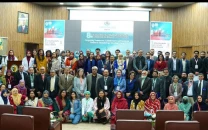‘Incompetency, ill-trained workforce setback for pharmacy sector’
Expert says no significant research is being carried out in Pakistan in the field of pharmacy.

Expert says no significant research is being carried out in Pakistan in the field of pharmacy. PHOTO: FILE
Incompetent and ill-equipped human resource has permeated in the pharmaceutical sector in Pakistan, adversely affecting medicine quality, availability and appropriateness.
This was said by Dr Zaheer Baber, head of Pharmacy Practice at the University of Auckland, New Zealand, who has come to Pakistan for a month to conduct training sessions and workshops on the pharmaceutical sector, which has perpetually remained ignored in the past.
The sessions are being conducted in collaboration with the University of Auckland, the Ministry of Education, the Dev-Net, the World Health Organization (WHO) and the Health Services Academy (HSA).
Talking to The Express Tribune, Dr Baber said that the single most important underlying problem afflicting the pharmaceutical sector in Pakistan was lack of competent and well trained workforce.
“This weakness permeates throughout the system to affect medicines quality, availability and appropriateness which is reflected through horrifying stories of human sufferings linked to medicines reported in the media almost every other day,” he said.
Dr Baber stressed for creating awareness among doctors, the hospital staff and public on use of medicines and its side affects.
“In Pakistan, chemists continue to sell medicines without doctors’ prescription and even doctors continue to prescribe medicines without considering their side affects which is dangerous and worrisome,” he said.
Dr Baber hoped that the sessions will help yield dividend to transform the pharmaceutical sector in Pakistan.
A member of the Pakistan Pharmacists’ Association told The Express Tribune that after devolution of the ministry of health under the 18th amendment, the pharmaceutical industry was badly suffering. According to him, due to absence of a strict check and balance mechanism at many levels, spurious medicines were being sold in the market.
“There has been a mushroom growth of chemist shops in the past few years in the country but no one bothers to visit them and check if the persons selling the drugs are qualified enough for the job.”
Executive Director of Dev-Net Ayyaz Kiani said that though both public and private sector universities in the country were offering pharmacy classes to students but they lacked well-trained teachers, technology, equipment and resources to conduct research.
Published in The Express Tribune, December 21st, 2013.



















COMMENTS
Comments are moderated and generally will be posted if they are on-topic and not abusive.
For more information, please see our Comments FAQ